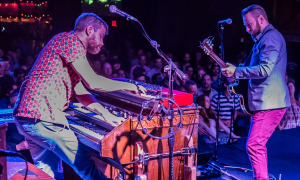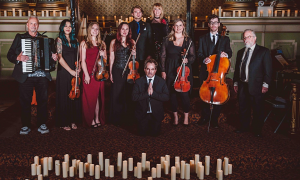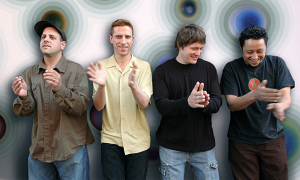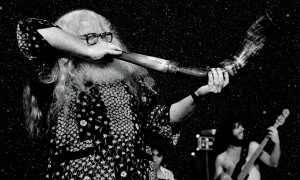Home » Jazz Articles » From the Inside Out » Lost Within Jobim, the BOOM, and You
Lost Within Jobim, the BOOM, and You
 Albare
AlbarePlays Jobim Vol. 2
Alfi Records
2021
"I was 14 when I first heard the music of Tom Jobim," recalls Albare, nom de guerre of guitarist Albert Dadon. "I already had six years of guitar learning under my belt. When I first heard those bossa chords, my ears were opened in a whole new way. A musical seed was planted in my brain that would never leave me."
Plays Jobim Vol. 2 continues the story from Volume 1, released in May 2020, and polishes many of Jobim's most famous and favored compositions into a bright glow. It features delightful guest contributions from such first-call musicians as trumpeter Randy Brecker, flutist Nestor Torres and drummer Antonio Sanchez (master accompanist for such legends as Pat Metheny, Chick Corea and Charlie Haden). But the undeniable star of this show is Jobim's music, and the guitarist's loving renditions and tributes to it.
Albare's unaccompanied introduction to "Dindi" hangs in the air like luscious sonic smoke, notes hanging heavy yet floating and then dissipating to make room for the next phrase. The rest of the ensemble takes that cue and dances at a languorous tempo with cymbals and strings shimmering like a dream and suspending the melancholy melody between orchestral and Brazilian jazz. Pianist Joe Chindamo abstractly muses the melody in his solo intro to "Once I Loved," and his gentle yet firm touch sounds so complementary to Albare's guitar. In both of these tunes, drummer Sanchez sounds simply sublime, neither overplaying nor underplaying, as perfectly pristine as Brazil's legendary rhythm ace Dom Um Romao.
"Favela," featuring Brecker's impeccable flugelhorn, raises the tempo and heat. Brecker floats and flutters from note to note so lightly that he barely seems to touch down in the arrangement, which gloriously pulls the introduction from Jobim's classic "Wave" into its handoff between the flugelhorn and guitar solos!
"If you find the head of my rendition with my friend and collaborator Nestor Torres of 'How Insensitive' resembling that of Wes Montgomery, it is because I am paying tribute to Wes," Albare explains. Strumming chords on the upbeats helps pull out the drumming and creates a thicker but no less balanced sound. Torres ends his flute solo with the first few notes of the original melody, which he lovingly hands back for the guitarist to sing.
"Everything you are hearing in my Jobim albums is my attempt to honor in my own way a music that moved my soul nearly fifty years ago," Albare concludes. "Maybe I needed all those years to figure out how to best do this."
 Franco Ambrosetti Band
Franco Ambrosetti BandLost Within You
Unit Records
2020
Lost Within You is a masterpiece of smoldering passion and beauty ignited by the exquisite trumpet and flugelhorn melodies of Franco Ambrosetti.
Ambrosetti assembled an enviable ensemble: bassist Scott Colley and drummer Jack DeJohnette in the rhythm section, plus guitarist John Scofield, and Renee Rosnes and Uri Caine switching turns as pianist. But the star of Lost Within You is Ambrosetti's haunting, delicate and graceful sound, revealed in one masterful ballad after another.
"Miles Davis was one of the great inspirations for that," Ambrosetti recalls. "From listening to Miles play ballads, I started to understand and I was able to go inside the ballad and play these long notes that he was playing. Miles showed me how you stretch the notes out like you're really singing or crying, and I think I can express my feelings better that way."
DeJohnette sketches an abstract introductory framework on piano to the opening "Peace," from which Ambrosetti's trumpet rises up like shimmering heat to meet and complete. When the rest of the ensemble settles in, the mood shifts from beautiful to transcendent jazz music.
Solo drums curiously open the classic "Body and Soul," but bass and piano quickly settle down into a slow-rolling tempo and a mood that's both ballad and blue— although DeJohnette insists on busting up the middle section with harder and sharper beats. Caine builds up funky blue offbeats and phrases and then crosses them together to build more complex melodies and harmonies in his solo. But Caine is only the second-best soloist here. Ambrosetti's sound thoroughly ghosts Davis' moody brooding: part smoldering anger, part aching sadness, part bitter loneliness, and part peaceful resignation. That's a lot to pack into a sound, but Ambrosetti does it.
Rosnes jumps in on "Flamenco Sketches," a landmark of Davis' work with pianist Bill Evans, and her melancholic deep touch is perfect for this mood and for highlighting Scofield's guitar alongside the Spanish tinges of this tune. Rosnes' thoughtful fire also polishes the middle piano trio section into a warm glow.
McCoy Tyner's "You Taught My Heart to Sing" closes Lost Within You. A love song and the word "sing" are entirely appropriate to end a set of music like this. Rosnes, Scofield and Ambrosetti all stretch out in solos like housecats settling down for a nap, with Scofield's guitar drifting in and out of the blues and the leader's horn so softly but clearly articulating each note that it almost sounds like whispered speech.
 Robert Castelli and BOOM
Robert Castelli and BOOMParty at One World Plaza
Castelli-in-Cielo
2020
Third-generation drummer Robert Castelli demonstrates the different aspects of great jazz drumming as he leads his live ensemble through his own compositions in this energetic, bouncy and thoroughly lively Party at One World Plaza.
A New York State native based in Barcelona (after living for several years in Austria), Castelli throws this collective BOOM down with the help of groove mixologists from around the world: Argentinian guitarist Dani Perez, Swiss keyboardist Gilles Estoppey and Spanish bassist Emilio Martin. Castelli has been teaching music since he was 20 and performing since he was 14. "I've been a band leader since 2007 and have toured my BOOM project every year from 2009 to 2019 in Europe," Castelli explains.
The digital Party at One World Plaza download adds seven live tracks to six studio originals, many reprised in heated live workouts. The opening studio track "Vamos" takes just a few moments to open up into a bouncy jazz fusion groove powered by several sharp guitar and drum breaks, and the live version sounds even more raw, energetic and fun.
Castelli and Martin create a sunny, swinging Caribbean feeling for its title track—not reggae's metronomic pulse but a dancing rhythm definitely warmed in the tropics. Castelli stretches out more as this "party" chugs on, rolling and tumbling across bars beneath the guitar chords with all the crisp articulation of jazz and the roundhouse thump of rock. Their extended live version of this dance doubles its playing time.
"Floatin'" moves in more moderate meandering to sound precisely like its title promises, as Perez on guitar and Estoppey on keyboards fingerpaint sonic clouds in Jeff Beck / Jan Hammer watercolors that part for bass and guitar solos to shine through.
"For the Fallen" also floats along a thoughtful sound, opening with a guitar and keyboard duet that cymbals eventually sneak into from underneath. Castelli keeps in the background here more than on any other tune and stays mainly on brushes to keep his sound soft (and recorded so cleanly that it's clearly heard).
In "Samba Wamba Bamba," the closing studio track, Castelli swirls hard bop and jazz fusion into his rhythm mix before opening up an electric samba rhythm. He neatly shakes AND stirs snare drum and cymbals into the keyboards supporting the guitar solo, then energetically blasts through several unaccompanied breaks—rumbling and tumbling, articulate and melodic. Castelli stirs up the live version even more, splashing and slapping at the melody with cymbal and snare shots while Perez heats up his guitar with a sharp yet mellow, early 1970s George Benson sound.
"I write all the music for BOOM, which I feel not enough drummers do," Castelli suggests. "But as my father used to say: 'I'm not just a drummer. I'm a musician who plays the drums.'"
 Dom La Nena
Dom La NenaTempo
Six Degrees Records
2021
Dom La Nena creates curiously beautiful music by building cello, piano and vocals into layers of electronic sound ranging from a vocal choir to percussion and beats. Most pieces on Tempo—they're more pieces than songs—come and go in a quicksilver two or three minutes and leave behind a sense of wonder. "My intention on this album was to explore new ways to use my instrument," La Nena explains. "So I have used lots of pedals, guitar amps, and effects to change the original sound of the instrument and take it somewhere else."
Even while taking the cello's original sound "somewhere else," there no escaping the classical overtones that the instrument's sound drops in the listener's ear. So Tempo begins from there, right from its title track. "Tempo" seems to say much more than two minutes of music should allow, with criss-crossing cello building the framework and rhythm for her wordless vocal and glimpses of acoustic piano twinkling like a star in the mix. "Maybe because I have studied and listened so much to Bach (when you're a cellist, you spend all of your time working on the six cello Suites of Bach), you can clearly feel the influence here," La Nena explains. The instrumental "Valsa" further suggests a classical recital piece, with one set of overdubbed strings wrapping themselves up in the melody and another harmonizing so closely that they almost have a vocal quality.
She builds up "Moreno" from one deep, foundational root cello sound and brings in other instrumental and vocal sounds tuned to that root, creating Tempo's biggest and deepest—in a way almost tribal—sound.
Strong counterpoint between the instrumental and vocal parts of the arrangement helps "Esperando Alma," more of a figure than a tune at less than two minutes and feeling like a classical piece. "I wrote this album while pregnant with my daughter, Alma. 'Teu Coração' [which means "your heart"] was written for her, and I recorded the sound of her heart while she was in my belly," says La Nena. "That's the beat you can hear on 'Esperando Alma' and 'Teu Coração.'" Tempo's longest and most lushly orchestrated piece, "Teu Coração" rings out its sound of hope and promise with strings and piano and vocals (and, literally, heart), and sings a sweet, uncalculatingly reflective and honest song.
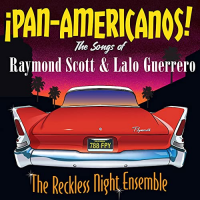 The Reckless Night Ensemble
The Reckless Night EnsemblePan Americanos: The Songs of Raymond Scott & Lalo Guerrero
Steady Beat Recordings
2021
Led by guitarist Skip Heller and bassist Nick Ornelas, The Reckless Night Ensemble on Pan Americanos feature the music of composers Raymond Scott and Lalo Guerrero and simultaneously captures two of Los Angeles' historic sounds in musical daguerreotype.
A chameleonic jazz-blues guitarist and small ensemble roots music master, Heller ties several different musical threads together into Pan Americanos. In the early 2000s, he teamed up in Los Angeles with Lalo Guerrero, often called the Father of Chicano music, and a small band eventually named The Reckless Night Ensemble (RNE) to swing and sing through Heller's arrangements of vintage Guerrero tunes.
Fast-forward to 2018: The family of Raymond Scott, a trailblazer in composing for films and electronics who passed in 2005, asked Heller to perform Scott's music at the Raymond Scott music festival, Scottworks 2018. Heller looped the RNE into this engagement, which turned out to be such a blast for all concerned that he kept the band together to record this half-and-half tribute to honor both Guerrero and Scott.
In the first half of Pan Americanos, featuring Guerrero's music, the composer's son Mark exchanges the male vocal in his father's classics "Los Angeles" and "Me Gusta El Cha Cha Cha" (the first single) with female vocalist Angelica Villareal, whose voice embodies every meaning of the word "vivacious." "Los Angeles" sounds like a love song written by and sent from Mexico to California. It rocks back and forth like a lullaby on the simple rhythm of a strummed guitar. Pianist Anthony Lopez keeps the lines in "Me Gusta" clean and sharp, stepping out for a lively solo spotlight.
The instrumentation in Guerrero's "Barrio Viejo," one of this set's longest and most dramatic pieces, is somehow sparse and mysterious and rises in power as Villareal's voice climbs in volume.
After the ensemble wobbles through Scott's exhausted blues "Coming Back Down to Earth," his music powers this set through a joyous conclusion. "Powerhouse" glides and rumbles on jungle drums through several exotic movements, including definite hard bop behind the saxophone solo, and suggesting a swing big band chasing a riff tied to its tail. Trumpet leads the band through the cinematic blues "Naked City," a languid groove that slowly floats in a haze of blue smoke and mystery, and on the lovely melody of "Portofino."
A bonus EP by Orquestra Rene, highlighted by the sunny samba "Who Do You Love," which feels like it just strolled in from a Mexican beach, and a "Yeh Yeh" instrumental so monstrously swinging that it turns your hips into pistons, packs in even more fun.
 Throttle Elevator Music
Throttle Elevator MusicFinal Floor
Wide Hive Records
2021
Final Floor marks the last stop of a band that one might say never really was.
Throttle Elevator Music was the name given to a jazz-punk studio cooperative project organized and operating from 2011 through 2017 around saxophonist Kamasi Washington, drummer Mike Hughes (aka "Lumpy") and composer and guitarist Gregory Howe. Howe also founded and serves as producer and engineer for Wide Hive Records, the label that recorded and distributed their music. He notes on the back jacket that "this album represents the last original material from Throttle Elevator Music."
Harnessing the open throttle drive of punk into more complex jazz sounds and visions might sound contradictory. But Final Floor is powered, not hindered, by these contradictions and contrasts. This punk-jazz sound, for example, is both collective and individualistic and can be both obvious and oblique: "Standards Reproached" presents 46 seconds of what sounds like the rhythm section and lead saxophone drag racing each other around in an ever-tightening circle that eventually collapses from nervous exhaustion.
The ensuing "Fast Remourse" continues gnawing on the same type of robotic punk-funk rhythm as twin saxophones Washington and Kasey Knudsen and trumpet (Erik Jekabson) take turns blowing jazz-rock solos over the rhythm section's howling hot metal rage before the track curiously unwinds to a slow stop just like the previous tune.
But much of this Final Floor lays down more spacy jazz. Its opening tune, "Supraliminal Space," opens in a wandering search that eventually settles into an unusual rhythm and melody that keeps revolving like it was in orbit, while Jekabson's trumpet rises and then crosses back and forth like a searchlight across it.
"Rooftop Sunrise," is the Final Floor's last, longest and most beautifully realized song. The juxtaposition of the trumpet's sad song against the machine- like, unrelenting background rhythm seems to signal that, in both joy and suffering, life somehow manages to keep moving on. Jekabson's trumpet has the last word, and the closing view of this Final Floor is a fading echo.
Tracks and Personnel
Plays Jobim Vol. 2Tracks: Dindi; Summer Samba; A Felicidade; So Danço Samba; Caminhos Cruzados; How Insensitive; Triste; Girl from Ipanema; Once I Loved; Favela; Meditation.
Personnel: Albare: acoustic and electric guitars; Joe Chindamo: piano, conductor; Pablo Bencid: drums; Luisito Quintero: percussion; Ricardo Rodrigues: bass; Randy Brecker: flugelhorn; Nestor Torres: flute; Antonio Sánchez: drums.
Lost Within You
Tracks: Peace; I'm Gonna Laugh You Right Outta My Life; Silli in the Sky; Love Like Ours; Dreams of a Butterfly; Body and Soul; People Time; Flamenco Sketches; You Taught My Heart to Sing.
Personnel: Franco Ambrosetti: trumpet, flugelhorn; John Scofield: guitar; Renee Rosnes: piano; Uri Caine: piano; Scott Colley: bass; Jack DeJohnette: drums, piano.
Party at One World Plaza
Studio Tracks: Vamos; Your Lucky Number; Floatin'; For the Fallen; Party at One World Plaza; Samba Wamba Bamba. Live Tracks: Vamos; Big Nick; Ramblin'; Your Lucky Number; Party at One World Plaza; Floatin'; Sambawamba jambo edit.
Personnel: Robert Castelli: drums; Dani Perez: guitar; Gilles Estoppey: keyboards; Emilio Martin: bass.
Tempo
Tracks: Tempo; Oiseau Sauvage; No Tengas Miedo; Todo Tiene Su Fin; Valsa; Quien Podrá Saberlo; Moreno; Doux de Rêver; Esperando Alma; Teu Coração; Samba Para Você; Vejo Passar; Milonga.
Personnel: Dom La Nena: voice, cello, piano; Julieta Venegas: voice.
Pan Americanos: The Songs of Raymond Scott & Lalo Guerrero
Tracks: Vamos A Bailar; Sixteen Pounds; Los Angeles; Adam & Eva; Me Gusta El Cha Cha Cha; Barrio Viejo; El Chicano; Coming Back Down to Earth; Powerhouse; Naked City; Portofino. Bonus EP: Who Do You Love; Street of No Return; To Say I Love You; Yeh Yeh.
Personnel: Skip Heller: guitar, sitar, bajo quinto; Nick Ornelas: upright bass, Ampeg baby bass; Jade Elliot: alto sax, tenor sax; Brennan Johns: mellophonium, trumpet, organ; Christin Hablewitz: clarinet, bass clarinet, piccolo; Anthony Lopez: piano, electric piano; Tyler Krutel: drums; Angelica Villarreal: vocals; percussion; Mark Guerrero: vocals; Louie Perez: vocal; Rebecca Schlappich: violin; Mike Bolger: accordion, trumpet; Rayner Fernandez: percussion; Matt Mattera: trumpet; Jason Fabus: alto sax, tenor sax; Luke Alberto: piano; Janet Ramiriez: vocals; Joe Quiñones: vocals; Kirsten Edkins: alto saxophone, alto flute; Marty Lush: vibraphone; Kevin Chubirka: drums; Dominique Rodriguez: percussion; Howard Greene: percussion.
Final Floor
Tracks: Supraliminal Space; Caste Off; Daggerboard; Ice Windows; Recirculate; Final Floor; Heart of Hearing; Return to Form; Standards Reproached; Fast Remourse; Rooftop Sunrise.
Personnel: Mike Blankenship: farfisa organ, synthesizer; Gregory Howe: guitar, Hammond B3, organ, synthesizer; Ross Howe: guitar; Mike "Lumpy" Hughes: drums; Erik Jekabson: flugelhorn, trumpet; Kasey Knudsen: alto sax, tenor sax; Matt Montgomery: bass, guitar, piano; Kamasi Washington: tenor sax.
< Previous
Me And The Devil
Comments
Tags
From the Inside Out
Chris M. Slawecki
Albare
randy brecker
Nestor Torres
Antonio Sanchez
pat metheny
Chick Corea
Charlie Haden
Joe Chindamo
Dom Um Romao
Wes Montgomery
Franco Ambrosetti
Scott Colley
Jack DeJohnette
John Scofield
Renee Rosnes
Uri Caine
Miles Davis
Bill Evans
McCoy Tyner
Robert Castelli
Dani Perez
Gilles Estoppey
Emilio Martin
jeff beck
Jan Hammer
george benson
Dom La Nema
The Reckless Night Ensemble
Skip Heller
Nick Ornelas
Raymond Scott
Lalo Guerrero
Angelica Villareal
Anthony Lopez
Throttle Elevator Music
Kamasi Washington
Mike Hughes
Gregory Howe
Kasey Knudsen
Erik Jekabson
For the Love of Jazz
 All About Jazz has been a pillar of jazz since 1995, championing it as an art form and, more importantly, supporting the musicians who create it. Our enduring commitment has made "AAJ" one of the most culturally important websites of its kind, read by hundreds of thousands of fans, musicians and industry figures every month.
All About Jazz has been a pillar of jazz since 1995, championing it as an art form and, more importantly, supporting the musicians who create it. Our enduring commitment has made "AAJ" one of the most culturally important websites of its kind, read by hundreds of thousands of fans, musicians and industry figures every month.






